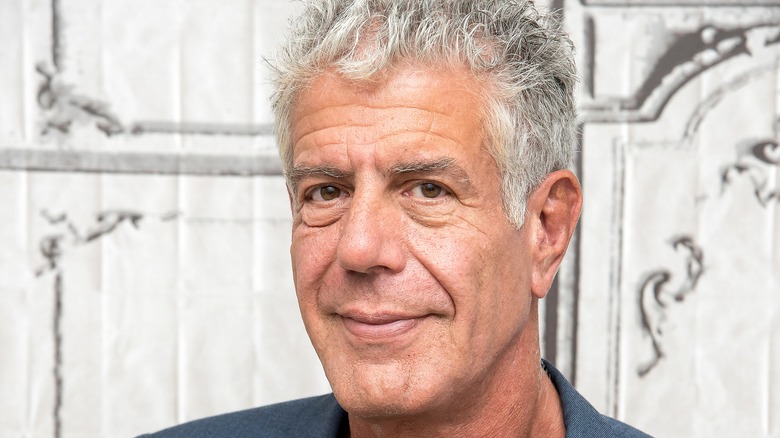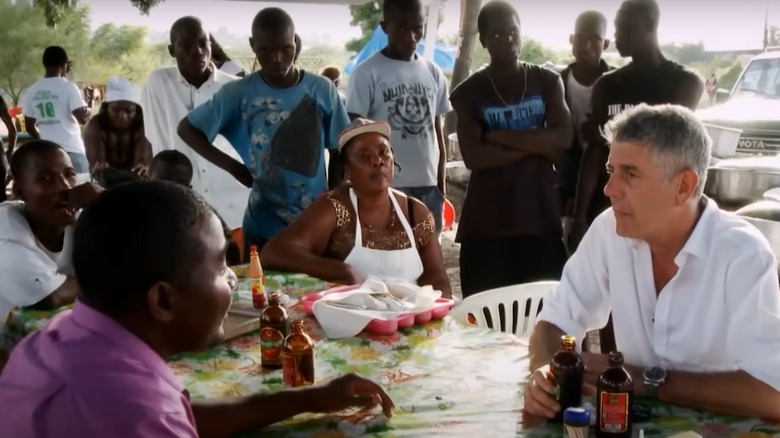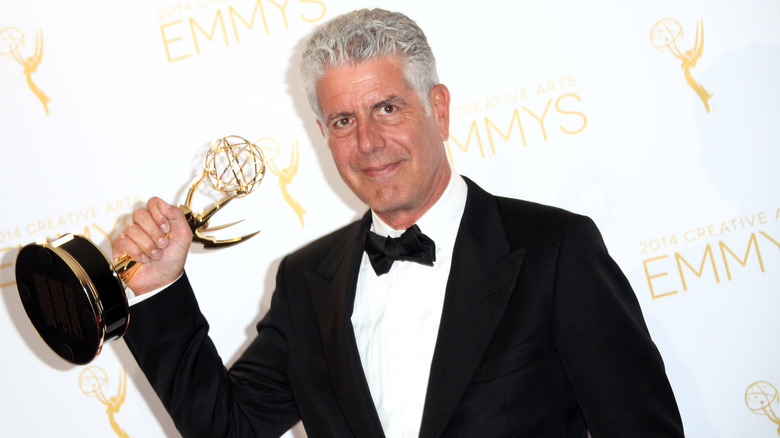How Anthony Bourdain Picked His Travel Destinations For No Reservations
Seeking out destinations well beyond his own scope of familiarity on "No Reservations" was an intentional move on Anthony Bourdain's part, but he did not start his television career by visiting war-scarred and politically tense locations. His knack for capturing cultural nuance in a meaningful way led him to grow what began as a typical food and travel show — punctuated by Bourdain's one-of-a-kind narration — into something that really pushed boundaries.
For "No Reservations," Bourdain chose places "that were a little less comfortable, a little more off the beaten path," he said in an interview with National Geographic. This was to show a new perspective, not for shock value or an adrenaline rush. "They forced us to think of new ways to tell the story," he explained of areas like Iraq, Turkey, the Amazon, Cuba, and Haiti. As much as Bourdain loved sipping on a martini in an NYC bar close to home, before his passing, he had also hoped to visit countries like Venezuela, Yemen, and Afghanistan.
Anthony Bourdain's best advice for finding great restaurants in any city centered around consulting experts — the local people. His team found that blogs written by folks from the area in question were particularly useful. Their passion for street food and indigenous cuisine guided Bourdain to culinary hidden gems, alleyway secrets, and unassuming eateries that his show became well-known for. He also gave significant credit to on-site guides and security for ensuring the crew's safety and providing great insight into local restaurants.
Anthony Bourdain's experiences on No Reservations
During his years filming "No Reservations," Anthony Bourdain avoided obvious tourist countries like Switzerland, and opted for locales that required more forethought. For example, before his trip to Kurdistan — a mountainous region between Iraq, Turkey, Iran, Syria, and Armenia — he underwent war zone safety training. To visit Cuba in 2011, Anthony Bourdain needed to obtain special permission.
Visiting Haiti after the 2011 earthquake during a serious cholera outbreak brought Bourdain to a place where many were food insecure. On one occasion, Bourdain decided to buy out a food stall and share the meals with locals. The well-intentioned decision — which Bourdain retrospectively described as "maybe foolhardy" — had unintended consequences as people tussled for the plates, creating a very tense situation he had not foreseen. Bourdain's experience filming in Libya in 2013 on his next program "Parts Unknown" — a location he had planned to visit on "No Reservations" — was particularly difficult. They hired an armed militia for protection, could not spend longer than 20 minutes in a single location, and had to be ready to evacuate at any moment.
Through it all, Bourdain kept the focus on local people. Though there are no clear answers on the ethics of creating a food-based show in countries where people were struggling to feed themselves or stay safe on a day-to-day basis, Bourdain was able to expertly handle the nuances with humility, acknowledging his own privilege and missteps along the way.
Traveling to a wide range of regions brought No Reservations critical acclaim
That candid honesty and Anthony Bourdain's desire to continuously travel beyond his comfort zone made episodes of "No Reservations" incredibly noteworthy. His intention was always to affect an area minimally, but "there is something destructive about the camera," Bourdain acknowledged in an interview for the Archive of American Television (via YouTube). He went on to explain how the production team ensured that they were being as unobtrusive as possible by using a limited crew, small cameras, and even being thoughtful about the placement of cameras during interviews. This intentionality, combined with detailed planning and trusted security, allowed Bourdain access to regions where many other travel show hosts had not ventured.
Bourdain's experience filming in Beirut, Lebanon in 2006 when the city was at war with Israel, for example, captured just how dedicated he was to creating meaningful television. Even in a security lockdown, he was able to capture the Lebanese experience through an honest lens. This episode was one of many to receive an Emmy nomination. In fact, this experience influenced the thematic direction of future shows, and Bourdain told National Geographic it was "one of our proudest accomplishments."
"No Reservations" later received two Emmy awards for a 2009 episode in Laos, and the 2011 episode in Haiti. It's that sincerity, thoughtful production, and willingness to travel boldly that brought "No Reservations" not only multiple awards, but a relevance that has continued on even after Bourdain's death.



